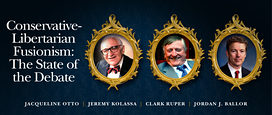In his response essay, Jordan Ballor argues as follows:
What these differing conceptions of liberty amount to, in my view, is this: one views liberty, particularly political liberty, as an important and yet limited good, while the other views liberty as an end in itself, in fact the highest end of human life itself. The former view of political liberty is primarily that it is an instrumental good that is a necessary condition for the realization of even greater goods in other spheres, like the family, the church, voluntary associations, markets, and so on. The latter view holds liberty in the political realm to be, in some significant sense, the highest expression of human good and a codification of the freedom of choice as a good as such. To put it bluntly, one views liberty as the freedom to do what we ought, while the other views liberty as the freedom to do what we want.
There are two serious problems with this viewpoint.
The first is that Mr. Ballor is making an error when he assumes that libertarians do not have an interest in “greater goods in other spheres.” This criticism comes up frequently, with the assumption that libertarians say “It’s liberty or civil society, one or the other.” But this is most emphatically not true. Libertarianism is about the choice between voluntary and non-voluntary. It’s about liberty vs. coercion.
It is not about social vs. isolated. Indeed, most libertarians recognize the power of civil society and hope to strengthen it as a bulwark against government excess. Arnold Kling, when he wrote his essay on “civil societarianism,” was of this view.
The second problem is found in the phrase “views liberty as the freedom to do what we ought.” I then have to ask: who decides what we ought to do? The church? There are a thousand and one different churches, each with a slightly different view of what we ought to do. Voluntary organizations? Each one has their own code of ethics and its own agenda. I can go on and on but in the interest of brevity will stop here.
The problem is that we don’t really agree on what we ought to do. In fact, that’s why politics exists in the first place: because people have different concepts of what the good life is and what we ought to do, and usually they use government to promote their view. The raucous disagreements between left and right on issues such as sexual liberation, immigration, race relations, gender equality, and Kevin Sorbo vs. Matt Damon show that there is really no consensus on what we ought to do at all.
By contrast, by putting liberty first politically, we simply recognize the obvious: that people have different views of the good life, and we let them pursue those views through peaceful means. There is some ought to do within libertarianism, but it’s rather minor: don’t kill, don’t steal, don’t kidnap, don’t censor, and the like. It is merely recognizing other humans as ends in themselves, not as the means to an end. That’s a necessity for modern society.
Given a choice between a view that said we need liberty to do the things that we ought to do, and then gave a list of those things—and another view that gave us liberty because liberty is a value, and let us choose what things we think we ought to do on our own, I would chose the latter unhesitatingly. Yes, I would put liberty as the goal, because without liberty, without the ability to choose for oneself what the good life is, life itself is pointless.

